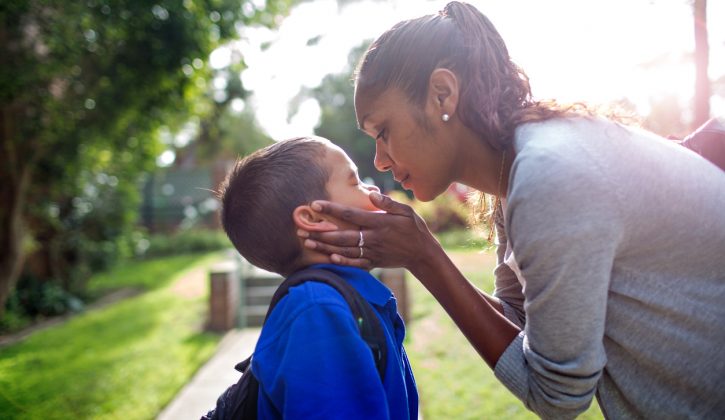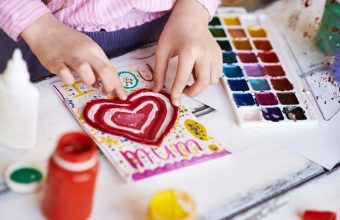According to stepfamily.org, 75% of those who get married and then divorced end up remarrying. Out of those that are remarried or living together, 66% of them break up when children are involved.
I’m delving into the truth of blending families because many people seem to want to know how blended families truly work. And the question that stuns me the most is, ‘I have a friend who’s in a blended family and she says she doesn’t love their partner’s children as much as their own. What do you think?’
It’s a very personal question, which is why almost everyone who asks me if I love my partner’s children as much as the two I gave birth to hides behind the phrase, ‘I have a friend…’
It’s not that I find the question inappropriate, although many might. I do think it’s a brave and honest question. Why? Because so many in blended families aren’t open about the hurdles of living and being in a blended family. Blending families is fucking hard. And being in one does make you reflect about love almost constantly.
So, do I love my partner’s children as much as my own? I’ll get to that. Each blended family is different, and this is my story.
My partner’s children came into my life when they were 9 and 11 years old. They were too old for me to have to bathe them, or change diapers, or calm them to sleep at night. I liked them immediately, but never professed to be their mother, or even acted like one. To this day, I will only act like their mother when one of them is sick and I plead with their dad to take them to the doctor.
When I gave birth to my daughter and she was placed in my arms for the very first time, I’ve never felt so utterly and deeply in love. I cried tears of joy. It was also a fierce love, meaning I knew that if anyone ever even attempted to hurt or harm my baby ever, I would kill them.
So that kind of protective, fierce, unconditional love didn’t come instantly with my partner’s children. I didn’t cry tears of joy when I met them. How could I? They were two children I had just met. And they were too old, and it would have been too weird, for me to start cuddling them as if they were my own. Since they have a good mother, I never felt the need to parent them as I do my daughter and son. I don’t ask if they’ve done their homework, like I do my daughter. I don’t tell them that they can’t wear makeup, like I do my daughter. It’s expected that my daughter treats me with respect, and though my partner’s daughters do treat me kindly and respectfully, I don’t make a fuss when they don’t.

According to experts, and this interesting article, it takes between two and five years to get used to blending families. It’s been almost 7 years since we blended and, to be truthful, it’s still often a rocky ride.
Unlike what experts profess, I think the early years were the easiest. We were in a honeymoon phase. They were actually the best of times. It was only over the years that I’ve realized being in a blended family is a constant bumpy ride. Plans are constantly changing. Feelings get hurt. We’re all fighting for attention. We all have felt unloved or not loved enough.
Over the years of blending, I fully admit, that if there was any sort of disagreement between my partner and my daughter, my immediate reaction is to always side with my daughter. Truth be told, I still do mostly side with my daughter just as my partner will usually side with his children if there is a disagreement. It’s not fun. It’s exhausting. It’s emotional. Often, no one is happy.
My partner’s children asked him more than once, especially in the early days, if he loves me more than them. He told his children that it’s not a matter of loving each other more, it’s just a ‘different kind of love.’ When I asked, point blank, if Daddy #2 loves my daughter as much as he loves his own kids, he will stick to, ‘It’s a different kind of love.’ But, by admitting and saying it’s a ‘different kind of love,’ maybe makes it unequal. Then again, I think all parents, even in a traditional household, love their kids equally but in different ways.
I’ve talked to many children of divorce, many of whom grew up in a blended family. And guess what? They’re the first to tell you that they know they were treated differently. They don’t necessarily say this in a bad way, but it’s worth noting that children feel that there’s a difference in how they were raised with their parent’s new partners and new siblings added to the mix. Ideally, loving all the kids equally would be amazing. In theory.
I have friends who have been in blended families who admit they don’t love their partner’s children as much as their own, especially if their stepchildren are disrespectful to them on a constant basis. This is why the divorce rate for blended families hovers around the 80 percent mark.
Over the years I’ve learned that you can’t have expectations when it comes to love in blended families. You can’t force someone else’s children to love you, which also begs the question: can you force yourself to love someone else’s children? Do my partner’s children love me as they do their own mother? Absolutely not. My daughter is definitely fond of my partner, although it’s clear she loves her own Dad more.
Some of it comes down to quality and quantity of time. My daughter lives with us full time. When they were younger, my partner’s children were only here 50 per cent of the time. Now, we’re lucky if they sleep over once a week. I raised my daughter as a single mother for years. So I had already known her, and we had such a great bond for nine years before my partner and my partner’s children came into my life. So, yes, I knew my daughter better and for longer, and this may be a factor.
So – to answer the question, do I love my biological children more than my partner’s children? My answer is that it’s fuzzy. But that doesn’t mean it’s bad. ‘Fuzzy’ love is still love.
If you were looking for a definitive yes or no, I’m sorry to disappoint. What I can say is that I have such fondness for them. The best way I can describe loving someone else’s children is like this – it’s like being best friends with someone and suddenly you both realize that your feelings are stronger than ‘just friends.’ It’s the kind of love that just sneaks up on you and you realize – I not only like you, but I love you.
Often these turn out to be the best and happiest types of relationships, don’t they?
Tagged under: love,relationships,blended family,blended families
Category: mom-101






